Turkish decomposed. The army starts, but does not win?
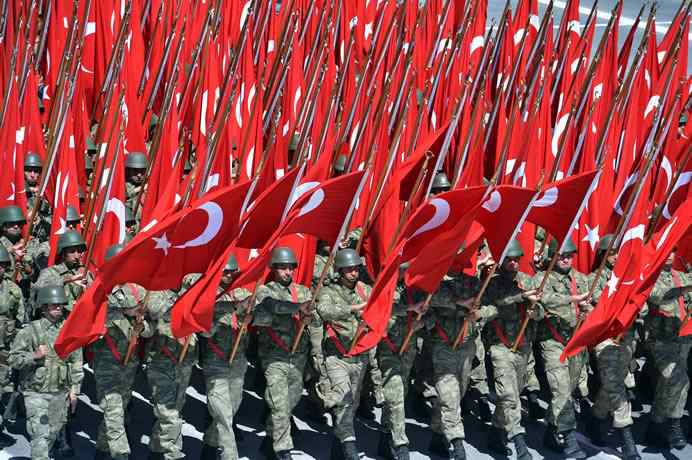
Let's start with the Turkish army. Turkey is one of those countries in the world where security forces traditionally played a very important role in political life. It happened historically, since the days of the Ottoman Empire. But under the Sultans, the armed forces did not yet have the influence that they gained later, after the fall of the monarchy. The father of modern Turkish statehood, Mustafa Kemal Atatürk himself was a professional military man, a general of the Turkish army. It was the coming to power of Atatürk, relying on the army, that formed the vector of development of the Turkish state and society. The army has become the main guarantor of the "secularism" of the Turkish state and the personification of the policy of Turkish nationalism. Turkey is proud of its army, which, by the way, is the second largest in NATO after the US.
By the way, Mustafa Kemal Ataturk himself opposed the direct intervention of the army in the political life of the Turkish state. But the system created by him provided all the conditions for this. The non-participation of the army in political life did not mean distancing the military from issues of national importance. Rather, the army was given the role of an arbiter who was in charge of ensuring the internal and external security of the country and not allowing radical changes in the country's political course. For Turkey, this was all the more relevant because Ataturk's reforms faced with enormous opposition from religious circles and fanatical believers. Without the support of the army, the conservative part of Turkish society simply would not allow to carry out reforms aimed at the secularization of the country, and the Ataturk regime would be doomed to fall.
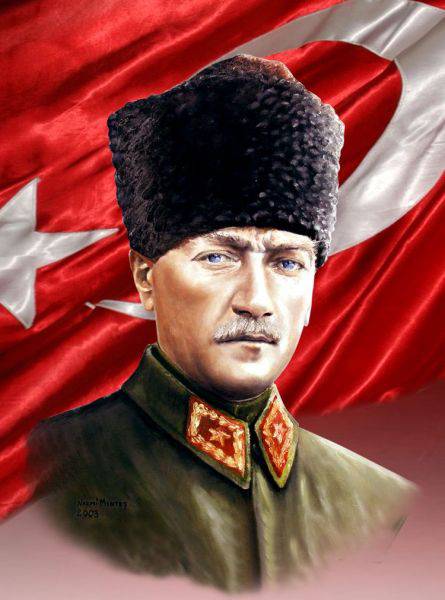
The army also became the main social elevator in Turkish society. Kemal Ataturk’s revolution was not anti-capitalist; therefore, both the big bourgeoisie and the big landowners remained in Turkey. But thanks to the military service, an opportunity was created for the vertical social mobility of middle and lower classes. The peasants, who were called up for military service, also won - in the army they received not only a military specialty, but also knowledge that could be in demand "in civilian life". At the same time, the army service for the peasants also acted as a means of “brainwashing” —in the classes in parts, people from backward areas gradually realized all the advantages of the secular path of development of the Turkish state.
For a long time, the power in Turkey exclusively belonged to the Kemalist Republican People's Party, so the armed forces did not interfere in the political life of the country, confining themselves only to actions against Kurdish tribes in the south-east of the recurring uprisings in the south-east of the country. However, a partial politicization of the army environment, primarily of the junior and middle officers, took place gradually. Young officers did not approve of the concentration of power in the country in the hands of one party and hoped to turn Turkey into a democratic state with developed political competition. Meanwhile, in 1946, the most important event in the political life of the country took place - a second legal political party was created - the Democratic Party of Turkey, headed by lawyer Adnan Menderes (1899-1961). In 1950, the Democratic Party managed to win the election and become the ruling party of the country, pushing the Republican People's Party into opposition. Adnan Menderes became the prime minister of Turkey for ten long years.
The Democratic Party pursued a policy in the interests of capital, including foreign, sought to transfer private ownership of state property. Ultimately, this caused discontent of the Turkish military elite. The officers concluded that the Republican People’s Party ran the country better than the Democrats. It should not be forgotten that most of the officers, even those who studied in the United States of America, remained in nationalist positions and were opposed to turning Turkey into a full US satellite. The anti-American sentiments of the officers were also welcomed by a large part of Turkish society, so a military coup in the spring of 1960 was quite expected. On the night of 27 in May 1960, soldiers from a number of units stationed in Ankara seized government buildings. Power passed to the National Unity Committee, which included 5 generals, 15 colonels and lieutenant colonels, 12 majors and 6 captains of the Turkish armed forces. Prime Minister Menderes was arrested and hanged in 1961 following a court sentence. President of the country became Army General Jemal Gursel (pictured).
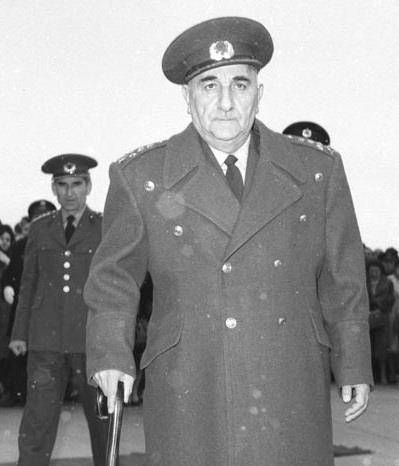
The 1960 coup of the year opened the first page in the subsequent almost thirty-year military rule. 1960 to 1989 Turkey was headed exclusively by representatives of the military elite - Generals Jemal Gursel and Cevdet Sunay, Admiral Fakhri Koruturk. The officer corps of Turkey has become one of the main core components of the national elite. The career of an officer for Turkish youth meant not only obtaining high social status, but also ensuring material well-being. The political influence of the military ensured that the military remained at the head of the state after the 1960 coup d'état. However, the situation in Turkish society still remained tense. In the south-east of the country in 1970-1980-s. the Kurdish national liberation movement became more active, both ultra-left-wing and ultra-right radical organizations were very active, and opposition from supporters of a secular state and Islamic fundamentalists grew. The second half of 1970's was marked by an unprecedented wave of violence in Turkish society. The total number of people killed in clashes and political murder victims is estimated at 6,5 thousand people.
Against the background of the overt weakness of political parties, the army continued to remain the only institution capable of instilling hope for a stabilization of the situation in the country. In September 1980 in Turkey there was a new military coup. General Ahmet Kenan Evren, Chief of the General Staff of the Armed Forces, came to power in the country. The military began to restore order in Turkey as they considered necessary - only by force and methods of repression. In prisons, there were at least 250 thousands of people - both right and left radicals.
There is a fairly reasonable opinion that the United States was behind the coup 1980. At the very least, the American leadership maintained close contacts with the Turkish generals who participated in the coup. Nevertheless, despite the repressive policy, it was in the second half of the 1980-s. Turkey began an economic upturn, which historians associate with the activities of Turgut Özal, in 1983-1989. headed the government of the country. In 1989, Özal replaced Evren as head of state and remained in that position until his sudden death in 1993. Thus, after 1960, Özal became the first civilian head of the Turkish state. But it was the democratization of political life that opened the way to power for Turkish religious fundamentalists. This was the beginning of the weakening of the political position of the military elite. Changes in world politics also contributed to the growing influence of religious circles. A return to Islamic values has been considered by a significant part of Turkish society as a completely acceptable way to overcome the ideological vacuum and strengthen the national unity of the country.
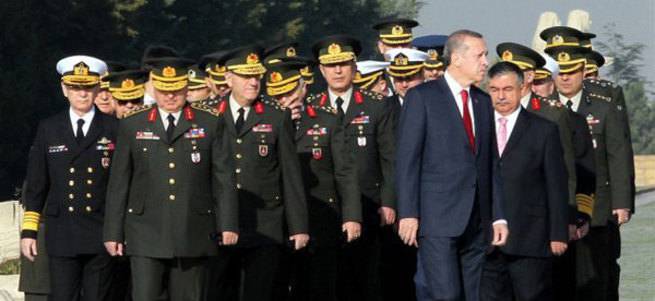
The coming to power of Recep Erdogan, who demonstrates his adherence to traditional Islamic values, of course, did not please the military elite of Turkey. In turn, Erdogan, knowing full well what the dissatisfaction of the military could turn into, took preventive steps. First of all, large-scale and unprecedented “purges” were launched in the officer corps of the Turkish army. In particular, the famous “Ergenekon” case was unwound, in which hundreds of servicemen and civilians were arrested. More than 240 people were sentenced to various terms of imprisonment, and General Ilker Bashbug, formerly the head of the Turkish General Staff, was sentenced to life imprisonment. In 2011, the 163 General and Officer were imprisoned, who, according to the prosecution, planned to overthrow the Erdogan government in 2003 and drew up a plan for “Operation Baloz” (“Maul”). In this case, the former commander-in-chief of the Air Force, General Ibrahim Fyrtyn, the former commander-in-chief of the Navy, Admiral Ozden Ornek, and the commander of the 1 th field army, General Cetin Dogan, were arrested. Otherwise, except as a demonstration of superiority of power over the army, it is impossible to explain the sentencing of 18 June 2014 of the tenth criminal court of Ankara to the conviction of almost a hundred-year-old retired general Kenan Evren. General Ahmet Kenan Evren (1917-2015) led a military coup in 1980 and until the 1989 served as president of the country. Despite his age, the 97-year-old general was sentenced to life imprisonment and demoted to the rank and file.
But it is impossible to ensure the loyalty of the army only by “purging” disgruntled officers. Therefore, one of the most important tasks for Erdogan was the “renewal” of the officer corps. For many decades, the military schools of the Turkish army remained strongholds of Kemalist ideology and a stronghold of supporters of a secular state. Erdogan headed for the gradual elimination of this tradition. More and more graduates of Islamic schools are enrolling in military schools, especially in the police and gendarmerie, where Kemalist positions have become much weaker compared to army, air force or navy units. On the other hand, many military men, not only generals and senior officers, but also junior officers and sergeants, prefer to leave military service "in the civilian world" in order to save themselves from the prospect of being arrested on trumped-up charges.
Personnel peripetias in the Turkish army are impressive. Only from the middle of 2012 to the beginning of 2013. the number of Turkish armed forces decreased by 50 thousand people. These are huge numbers - considering that approximately 400 thousand people serve in the Turkish armed forces, 50 thousand dismissed or dismissed - every eighth soldier. And this is, of course, not about ordinary military service, but about senior and middle command personnel, qualified military specialists in non-commissioned officer ranks. On charges of plotting a coup, more than 10% of the top naval commanders and 16% of the top commanders of the Turkish Air Force were arrested. Experts say about the dismissal of 8 of thousands of sergeants and senior sergeants from the special forces of the Turkish army. All these people are participants in the hostilities in Turkish Kurdistan, the military with great experience, but for them leaving the army seemed a more acceptable option than continuing to serve in a situation of constant risk of falling under the flywheel of repression.
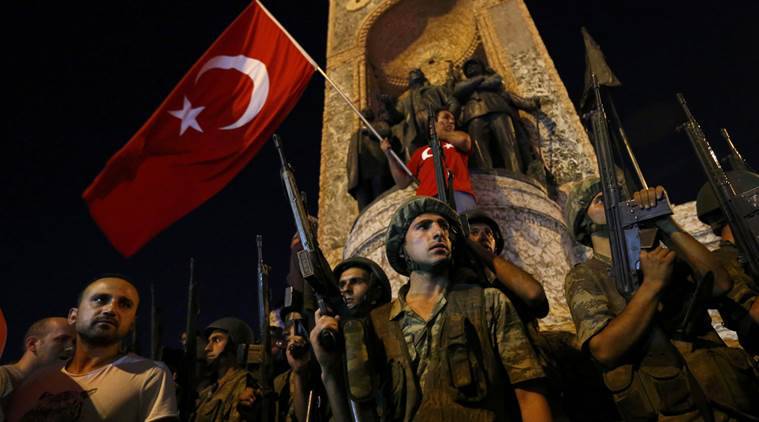
Naturally, such a policy of the Turkish authorities towards the military could not but cause a natural rejection among the generals and officers. But, as the 15-16 events of July 2016 showed, a coup was carried out according to the classical scheme already tested in Turkish stories, the military did not work. The conspirators were not supported by a large part of the army and Erdogan’s supporters succeeded in suppressing the intervention of the military without much difficulty. Arrest of more than three thousand military personnel, including regular representatives of the senior officers of the Turkish army, followed the rout of the insurgency. Among those arrested was Army General Adem Khudouti, who commanded the 2 Army, a strategically very important alliance deployed on the border of Turkey with Syria, Iraq and Iran. General Erdal Ozturk, the commander of the 3 Army Corps, and Major General Avni Angun, who commanded the Malatya garrison, were arrested.
However, in an effort to protect his power and the chosen political course from the risk of a military coup, Erdogan, organizing the repression of generals and officers, contributes, at the same time, to a real reduction in the combat potential of the Turkish armed forces. When hundreds of high-ranking generals, admirals, officers go to jail, and thousands of servicemen in lower ranks leave the ranks of the armed forces, regardless of experience and suitability for service, this causes enormous damage not only to the strength of the Turkish army, but also to the national security of the Turkish state as a whole. When thousands of officers and generals are ready with weapons in the hands of overthrowing their president, and after the failure of the coup, some of them are trying to flee to neighboring countries (for example, a helicopter with the Turkish military - participants in the coup landed in Greece), it is hardly possible to talk about the high motivation and unity of the Turkish armed forces. By the way, Erdogan called the coup attempt “a gift from God,” since it would allow him to continue the purges in the armed forces.
On the other hand, Erdogan would hardly have succeeded over many years in successfully neutralizing the dissatisfaction of the military elite and cracking down on the most active opponents among the generals if he had not had the support of a significant part of the military. If we consider the army as a slice of society, then we can conclude that in the army Erdogan is supported by about the same part of the military as part of the Turkish citizens as a whole. After all, it’s hard to refuse what it’s and what’s the support of a significant part of the country's population. However, the radical opponents of the Erdoganov regime in Turkey are also lacking in Kemalist officers. The split of Turkish society is inevitably transmitted to the Turkish armed forces.
To be continued ...
Information